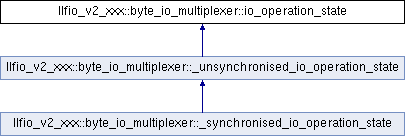An interface to a state for an i/o operation scheduled against an i/o multiplexer. More...
#include "byte_io_multiplexer.hpp"

Classes | |
| struct | lock_guard |
| Used by the visitor to control the state lock. More... | |
Public Member Functions | |
| virtual void * | invoke (function_ptr< void *(io_operation_state_type)> c) const noexcept=0 |
| Invoke the callable with the per-i/o state lock held, if any. | |
| virtual io_operation_state_type | current_state () const noexcept=0 |
| Used to retrieve the current state of the i/o operation. | |
| virtual io_result< buffers_type > | get_completed_read () &&noexcept=0 |
| After an i/o operation has finished, can be used to retrieve the result if the visitor did not. | |
| virtual io_result< const_buffers_type > | get_completed_write_or_barrier () &&noexcept=0 |
| After an i/o operation has finished, can be used to retrieve the result if the visitor did not. | |
| virtual io_operation_state * | relocate_to (byte *to) noexcept=0 |
| Relocate the state to new storage, clearing the original state. Terminates the process if the state is in use. | |
Public Attributes | |
| byte_io_handle * | h {nullptr} |
| The i/o handle the i/o operation is upon. | |
| io_operation_state_visitor * | visitor {nullptr} |
| The state visitor supplied when the operation was initialised. | |
Protected Member Functions | |
| constexpr | io_operation_state (byte_io_handle *_h, io_operation_state_visitor *_visitor) |
| virtual void | _lock () noexcept |
| virtual void | _unlock () noexcept |
Friends | |
| struct | lock_guard |
Detailed Description
An interface to a state for an i/o operation scheduled against an i/o multiplexer.
You will need to ask the i/o multiplexer for how much storage, and alignment, is required to store one of these using byte_io_multiplexer::io_state_requirements(). Be aware that for some i/o multiplexers, quite a lot of storage (e.g. > 1Kb for IOCP on Windows) may be required. You can either preallocate i/o operation states for later use, or use other determinism-maintaining tricks to avoid dynamic memory allocation for i/o operation states.
When you construct one of these using byte_io_multiplexer::init_io_operation(), you must pass in a pointer to a io_operation_state_visitor. This visitor will be called whenever the lifecycle for the i/o state is about to change (it is called just before .current_state() is changed, and with any per-state locks held).
The lifecycle for one of these is as follows:
- i/o initialised. This is after
byte_io_multiplexer::init_io_operation()has been called to initialise the i/o operation state. You can now no longer relocate the i/o operation state in memory until the corresponding*_finished()visitor function is called. - i/o initiated. One is notified of this by the call of the corresponding visitor
*_initiated()function. This may occur inbyte_io_multiplexer::init_io_operation(), inbyte_io_multiplexer::flush_inited_io_operations(), or never at all if the i/o completed immediately. - When the i/o completes, one is notified of the i/o's result by the call of the corresponding
*_completed()visitor function. This can occur at any time, and can be called by any kernel thread, if the i/o multiplexer in use is used by multiple kernel threads. The completion functions are usually invoked by somebody callingbyte_io_multiplexer::check_io_operation()orbyte_io_multiplexer::check_for_any_completed_io(), but may also be called by an asynchronous system agent. - The i/o operation state may still be in use by others. You must not relocate in memory the i/o operation state after
byte_io_multiplexer::init_io_operation()returns until the corresponding*_finished()visitor function is called.
Constructor & Destructor Documentation
◆ io_operation_state() [1/2]
|
inlineconstexprprotected |
◆ io_operation_state() [2/2]
|
inlineconstexprprotected |
◆ ~io_operation_state()
|
inlinevirtual |
Member Function Documentation
◆ _lock()
|
inlineprotectedvirtualnoexcept |
◆ _unlock()
|
inlineprotectedvirtualnoexcept |
◆ current_state()
|
pure virtualnoexcept |
Used to retrieve the current state of the i/o operation.
Implemented in llfio_v2_xxx::byte_io_multiplexer::_unsynchronised_io_operation_state, and llfio_v2_xxx::byte_io_multiplexer::_synchronised_io_operation_state.
◆ get_completed_read()
|
pure virtualnoexcept |
After an i/o operation has finished, can be used to retrieve the result if the visitor did not.
Implemented in llfio_v2_xxx::byte_io_multiplexer::_unsynchronised_io_operation_state, and llfio_v2_xxx::byte_io_multiplexer::_synchronised_io_operation_state.
◆ get_completed_write_or_barrier()
|
pure virtualnoexcept |
After an i/o operation has finished, can be used to retrieve the result if the visitor did not.
Implemented in llfio_v2_xxx::byte_io_multiplexer::_unsynchronised_io_operation_state, and llfio_v2_xxx::byte_io_multiplexer::_synchronised_io_operation_state.
◆ invoke()
|
pure virtualnoexcept |
Invoke the callable with the per-i/o state lock held, if any.
Implemented in llfio_v2_xxx::byte_io_multiplexer::_unsynchronised_io_operation_state, and llfio_v2_xxx::byte_io_multiplexer::_synchronised_io_operation_state.
◆ relocate_to()
|
pure virtualnoexcept |
Relocate the state to new storage, clearing the original state. Terminates the process if the state is in use.
Implemented in llfio_v2_xxx::byte_io_multiplexer::_unsynchronised_io_operation_state.
Member Data Documentation
◆ h
| byte_io_handle* llfio_v2_xxx::byte_io_multiplexer::io_operation_state::h {nullptr} |
The i/o handle the i/o operation is upon.
◆ visitor
| io_operation_state_visitor* llfio_v2_xxx::byte_io_multiplexer::io_operation_state::visitor {nullptr} |
The state visitor supplied when the operation was initialised.
The documentation for this struct was generated from the following file:
- include/llfio/v2.0/byte_io_multiplexer.hpp